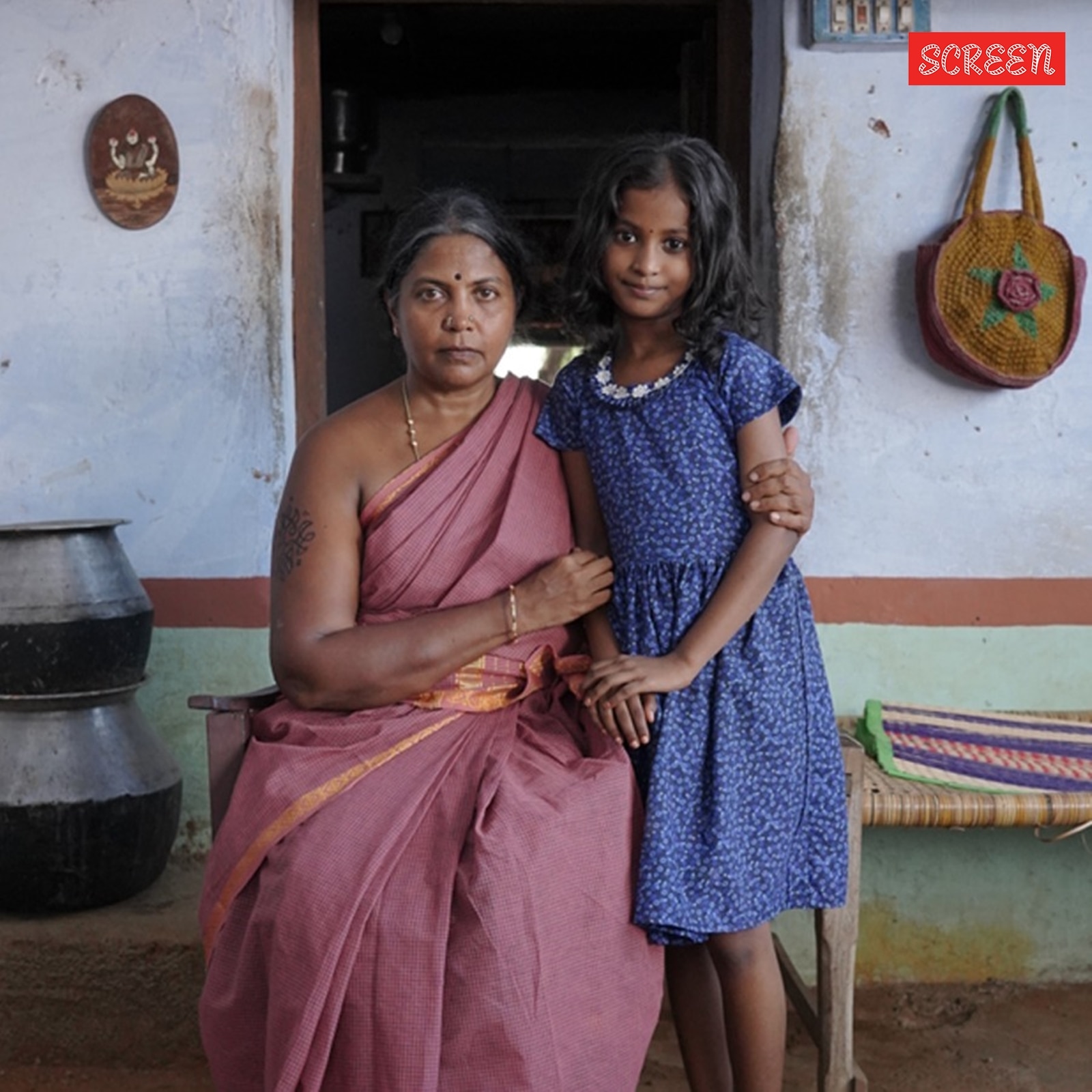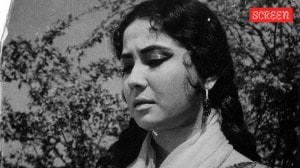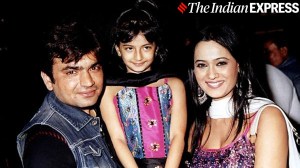Click here to follow Screen Digital on YouTube and stay updated with the latest from the world of cinema.
Angammal movie review: Given that the world has witnessed Nangeli’s battle against breast tax, this Perumal Murugan adaptation strikes hard
Angammal movie review: The Vipin Radhakrishnan directorial addresses topics such as women’s bodily autonomy, freedom of choice, caste, class, urban chauvinism, male hypocrisy, and more.
 Angammal movie review: Director Vipin Radhakrishnan’s Geetha Kailasam-starrer was one of the standout films at IFFK 2024, with its fiery themes, masterful writing and technical excellence. (Image: Njoy Films)
Angammal movie review: Director Vipin Radhakrishnan’s Geetha Kailasam-starrer was one of the standout films at IFFK 2024, with its fiery themes, masterful writing and technical excellence. (Image: Njoy Films)Angammal movie review: Whenever someone asks Angammal (the mesmerising Geetha Kailasam) why she refuses to wear a blouse before draping a saree, she either lashes out or dismisses the question outright, making it clear that she owes no one an explanation. Whether the question comes from her sons Sudalai (Bharani) and Pavalam (Saran) or Sudalai’s wife Sharada (Thendral Raghunathan), her response is more or less the same. However, when her granddaughter Manju (Yasmine) asks the same question, Angammal softens, embodying compassion and she tells the girl that wearing a blouse would hide the tattoo on her upper arm — a cherished feature that both she and the little girl love. While there is some truth to this reasoning, the audience can recognise that it is not the full story. However, what stands out here is Angammal’s readiness to open up to her granddaughter — who showers her with selfless love — contrasted with her defiance towards others who compel her to wear blouses under the guise of “showing standard” and this dynamic emphasises that Angammal is someone who yields only to love, not to authority or coercion.
Director Vipin Radhakrishnan’s Angammal, adapted from Tamil writer Perumal Murugan’s short story Kodithuni, was one of the standout films at the 29th International Film Festival of Kerala (IFFK), 2024, with its fiery themes, masterful writing and technical excellence. Set in a remote and rustic Tamil Nadu village located near a hillock in the mid-1990s, Angammal addresses topics such as women’s bodily autonomy, freedom of choice, caste, class, urban chauvinism, male hypocrisy, and more.
Only in SCREEN | Feminist Fathima movie review: A powerful film portraying challenges and resilience of stay-at-home wives, mothers
Pavalam, newly qualified as a doctor, is eager to marry his girlfriend Jasmine (Mullaiyarasi) who comes from a wealthy family. However, he sees his mother’s lifestyle and certain quirks as obstacles to his aspirations. Angammal, with her rural lifestyle, sharp tongue, stained teeth, irreverent attitude and refusal to wear blouses, becomes a source of embarrassment for him. Though neither Jasmine nor her family has ever commented on such matters, Pavalam assumes they would judge her — and, by extension, him — harshly. Driven by this insecurity, he devises a plan to “civilise” his mother, forcing her to conform to the standards he deems acceptable for the urban elite, disregarding her opinion and comfort in the process. When Angammal resists his efforts, the situation spirals out of control, drawing the intervention of even village elders in the matter of the elderly woman’s blouse.
Unlike typical films that deal with political themes where characters are placed on a hot plate throughout, Angammal takes a different route by giving its people moments of joy as well, exploring their likes and small pleasures, while also using these instances to reveal deeper aspects of their personalities.
Watch Angammal trailer here:
For Sudalai, whose formal education was cut short unlike his younger brother’s, life revolves around working alongside his mother in the fields to support their family. His moments of happiness come from playing the nadaswaram by himself in the open fields at night, letting the breeze accompany his music. Once a carefree troublemaker who frequently found himself in sticky situations, he is now a family man and his greatest aspiration is to master a fine tune on the nadaswaram, a skill he has taught himself. Pavalam, on the other hand, finds joy in spending time with Jasmine — watching movies and sharing heartfelt conversations. For Sharada, happiness stems from feeling heard and included, particularly during her chats with others, an emotional connection she misses in her relationship with her mother-in-law. For Angammal, her band of women, including her granddaughter, forms her happy space. Widowed at a young age, Angammal still harbours feelings for her childhood crush Kalimuthu (Vinod Anand) and seizes every opportunity to linger near his house — one of the many where she sells milk — stealing glances at him in a romantic manner, which he seems to enjoy and even anticipate.
While Pavalam’s demand that Angammal start wearing blouses can be interpreted as a reflection of urban elites’ obsession with imposing their codes and lifestyles on others — thereby erasing cultural nuances and promoting uniformity — it also carries deeper political undertones. The fact that Perumal Murugan chose a blouse, a garment that covers the breasts, as the focal point of this narrative holds significant weight, given India’s history with the inhumane practice of Mulakkaram (breast tax) in the former Kingdom of Travancore (in modern-day Kerala), where lowered-caste women were heavily taxed if they dared to cover their breasts. As the story (or legend) of Nangeli, the Ezhava woman who protested against this caste-based oppression by cutting off her breasts, continues to resonate in the anti-caste movement symbolising resistance and trailblasing courage, Murugan’s use of the blouse as a central motif adds further depth to the narrative. Meanwhile, one needs to also note that his mother’s clothing choice becomes an issue to Pavalam only after his city education and this detail becomes important since professional degree courses then (and still largely now) were accessible predominantly to forward castes and classes, who often perpetuate their dominance by imposing their values on others.
SCREEN at IFFK | I’m Still Here: This Brazilian political drama holds global significance, resonating from Palestine to various regions of India
Meanwhile, the Vipin Radhakrishnan directorial refrains from reducing breasts to mere body parts meant to be covered by blouses. In contrast to patriarchal norms, the film allows them to remain unrestricted by societal expectations. While Angammal’s generation discusses breasts openly, sharing opinions about blouses, the younger generation exhibits discomfort and inhibition. For example, when the news of Pavalam’s peculiar demand spreads, one of Angammal’s friends asks openly, “Why wear a blouse and hide everything?” as another elder remarks that wearing blouses enhances the breasts’ shape and makes them appear more attractive.
In another scene, we see a group of elderly women arrive at Kalimuthu’s house with neem paste to help his daughter-in-law wean her toddler girl. However, when they offer to apply it on her breasts, the young mother, visibly embarrassed, insists on doing it herself — revealing a newer form of narrow-mindedness in the newer generation. Here, the film’s setting in the 1990s, coinciding with the rise of globalisation, adds another layer of context as this was a period when people began aligning their lives with market-driven ideals, becoming enslaved by capitalist codes. If the market dictated that wearing a blouse signified completeness, people quickly conformed.
Ironically, at one point, we also see Pavalam turning to the village elder — who himself never wears a shirt and walks around half-naked — to convince his mother to start wearing blouses. This highlights the hypocrisy of men and their willingness to go to any lengths to win, even if it means turning a personal choice into a public matter that involves the entire locality. In contrast, the only ones who truly empathise with Angammal’s predicament are Manju and Jasmine, who feel deeply sorry that her sons and daughter-in-law are forcing her to conform to something she doesn’t want.
Interestingly, the film also portrays Jasmine’s parents being awed by Angammal’s natural grace when she is not wearing a blouse and flaunting her tattoo when they ‘accidentally’ come across an old photo of Angammal and Manju in the latter’s notebook. This scene emphasises that the so-called manners Pavalam wanted to instil in his mother were irrelevant to Jasmine’s family, who instead respected cultural ethos. It further illustrates how men have historically manipulated women to conform to their moral codes while also deflecting accountability by shifting blame onto others.
 Director Vipin Radhakrishnan’s Angammal is adapted from Tamil writer Perumal Murugan’s short story Kodithuni.
Director Vipin Radhakrishnan’s Angammal is adapted from Tamil writer Perumal Murugan’s short story Kodithuni.
Despite these themes, the makers do not present Angammal as an emblem of political correctness; instead, she is portrayed as a product of her time, embodying both strengths and flaws. For instance, while she claims to distrust wealthy people because they are cunning, Angammal assures her friend that she will discuss dowry with Jasmine’s family during their first visit itself. Similarly, although she is a strong and independent woman, her cruel treatment of Sharada — whom she regards as little more than a servant — reveals her own moral shortcomings.
Vipin Radhakrishnan’s brilliance shines in the minimalist yet sharp way he has constructed the film’s environment, particularly since the story is set in a bygone era and that too in a remote village. While the frames are not always overly crowded with period-specific props like movie posters, vehicles or other items — like the ones we see in scenes featuring Pavalam and Jasmine at movie theatres — Vipin, along with art director Gopi Karunanithi, effectively establishes the period and the characters’ lifestyles through a subtle yet rich approach.
Lenin Valapad’s sound design is one of Angammal’s major strengths, immersing the audience in the film’s world by paying meticulous attention to even the smallest details. Mohammed Maqbool Mansoor’s music adds soul to the stunning visuals captured by cinematographer Anjoy Samuel, refined through Pradeep Shankar’s masterful editing. The performances by Bharani, Thendral Raghunathan, Yasmine and Mullaiyarasi also deserve commendation.
Angammal movie cast: Geetha Kailasam, Saran, Thendral Raghunathan, Bharani, Mullaiyarasi
Angammal movie director: Vipin Radhakrishnan
Angammal movie rating: 4 stars


Photos
- 01
- 02
- 03
- 04
- 05
































